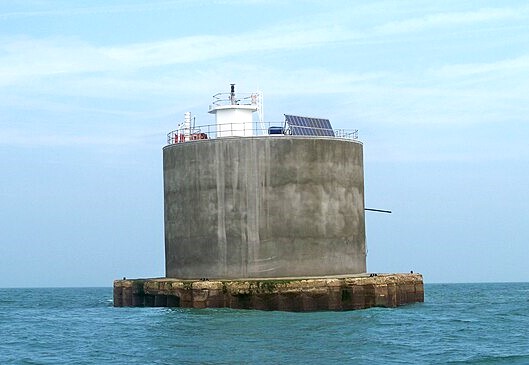Dredging
Trawling through YouTube recently we came across a fascinating video showing a huge dredger being used to widen a navigation channel in Southampton’s Western Docks.
Dredging is essential to maintain the viability of shipping channels, as sediment is constantly being washed downstream and filling channels and harbours. Associated British Ports (ABP) required the navigation channel to be widened by up to 46 m over a stretch of 2,300 m and for it to be commenced on December 1st 2023 and completed by 15th March 2024. These time constraints were necessary to minimise disturbance to wildlife, for example sea trout and migrating wild salmon.
Boskalis backhoe dredger 'Magnor'.Photograph taken from television
The work was carried out by Boskalis using trailer suction dredgers and the enormous backhoe dredger ‘Magnor’. Boskalis is a Dutch company with 100 years of experience in dredging across the world. With more than 500 vessels and floating equipment, it has conducted work in 90 countries and employs 11,000 workers.
Boskalis backhoe dredger 'Magnor'.
Photograph taken from television
‘Magnor’ is the largest backhoe dredger in the world. Its bucket can hold 33 cubic metres of material. More detailed technical information can be found here.
Boskalis backhoe dredger 'Magnor'.
Photograph taken from television
Before the dredging work could start, sediment had to be tested to discover the concentration of chemicals in it. Below specified levels, the dredged material could be dumped at sea in locations licensed by the Marine Management Organisation. Above those levels, the material would have to go to landfill.
The work has now been completed and all the dredged material has been dumped south of the Nab Tower in the Solent.
The Nab Tower, Solent
Image courtesy Wikimedia Commons
A professor of biology at the University of Portsmouth, Alex Ford, expressed concerns that the dredging would have deleterious effects on marine snails. TBT(tributyltin) used to be a component of antifouling paint, and was in use globally for 40 years, but was banned in 2008, following the discovery that it was extremely toxic to marine life, causing reproductive anomalies. In snails it caused females to grow male appendages and become infertile.
Marine snailThe professor said, “Since its ban in 2008, the incidence of imposex snails (females with a penis) has dropped considerably around our coasts but still persists in a few areas in the UK where there had been heavy shipping and ongoing dredging.
“Unfortunately, the concentrations of TBT in sediments do not
need to be high to cause sexual abnormalities in marine snails.”
.png)





I don't think I have ever seen a dredger at work, though I have heard of dredging being done here.
ReplyDeleteWe are a small island, never very far from the sea, so it's easy to see dredging without too much trouble. I like watching working vessels.
DeleteAs a child I holidayed in Southsea and always watched for the light of the Nab tower.Have never seen a photo and I am amazed how low in the water it seems to be.Thank you a very interesting post.Marilyn
ReplyDeleteIt's surprising how even large constructions can be dwarfed by the immensity of the sea.
DeleteThe Nab Tower is considerably smaller these days than is used to be even a couple of decades ago.
DeleteYes, it is. A following post may explain, if I can sift opinion from fact.
DeleteI know nothing about the sexual habits of snails, but in the area I grew up, the docks and rivers had to be dredged all year round. In those days the dredger scooped up the silt with a bucked digger.
ReplyDeleteWe're never far from water requiring dredging in this country!
DeleteThere's so many knock on effects for wildlife in everything we do.
ReplyDeleteOften, the effects are not realised until too late, sadly!
DeleteBigger ships in a limited number of ports makes us aware of dredging, but think of all the places that once were ports and are no longer so because of the natural accumulation of silt. Most of the Cinque port harbours are no longer commercial for example. Isle of Thannet is part of the mainland... and I am sure you can think of many other examples.
ReplyDeleteVery true. It is a mistake to think that the land is unchanging - erosion in some parts, silting in others.
DeleteThis is fascinating! Thanks for this. I'm going to bookmark and show it to husband.
ReplyDeleteI'm glad you enjoyed it.
DeleteDidn't know of this, so intriguing! Thanks for sharing
ReplyDeleteThank you.
DeleteYes, dredging is essential, but I didn't know it could affect marine snails that way.
ReplyDeleteOnly recently many news outlets have been saying that 'Britons should 'make friends' with slugs and snails in their gardens, charities say'
https://news.sky.com/story/britons-should-make-friends-with-slugs-and-snails-in-their-gardens-charities-say-13093881
All the best Jan
I'd heard about befriending slugs and snails. I find snails interesting and appealing, but not slugs. It's not their fault they don't have shells!
DeleteThank you for sharing this informative post about the dredging project in Southampton's Western Docks. It's fascinating to learn about the technology and machinery involved, especially the Boskalis backhoe dredger 'Magnor,' which is the largest of its kind in the world.
ReplyDeleteThere is a sub-culture to every undertaking and experts in so many varied fields. I find it fascinating to discover a little of other people's occupations.
DeleteWe see boats along lake Michigan dredging quite a bit. As you say, they have to keep the shipping channels open. Speaking of keeping shipping channels open, it's really interesting when we go up to the Mackinac Bridge in winter and see the ice breakers try to keep a shipping channel open when it's really cold.
ReplyDeleteApparently, there's more to dredging than meets the eye! xxx
ReplyDeleteIt's big business, in every sense of the word! x x x
ReplyDeleteI know dredging can have all sorts of unwanted and unexpected effects but I didn't know about growing a penis!
ReplyDeleteTrans snails! ;-)
DeleteThank you for this interesting post about dredging. Such a lot of planning required to make sure everything runs smoothly.
ReplyDelete